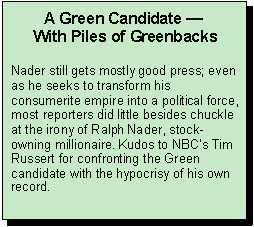Self-designated "consumer advocate" — and newly-minted Green
Party presidential nominee — Ralph Nader has been a leading
cheerleader for the Justice Department’s prosecution of Microsoft
for anti-trust violations. "We need to build on the lessons from the
Internet and stop Microsoft’s efforts to transform the Internet into
a private network dominated by a single, ruthless company,"
Nader argued in a column that was co-written by James Love,
director of Nader’s Consumer Project on Technology, and posted on
CNN.com back in November 1998.
 But
now that he’s running for President, Nader has been forced to
disclose that he owns more than $1,000,000 worth of stock in Cisco
Systems, a single company that has near-total domination of some
important Internet infrastructures. That would appear to contradict
at least one of the rules for socially-responsible investing that
Nader spelled out in
June 18 Washington Post interview. "Number one, they’re
not monopolists and number two, they don’t produce land mines,
napalm, weapons," Nader told the Post’s Mike Allen.
But
now that he’s running for President, Nader has been forced to
disclose that he owns more than $1,000,000 worth of stock in Cisco
Systems, a single company that has near-total domination of some
important Internet infrastructures. That would appear to contradict
at least one of the rules for socially-responsible investing that
Nader spelled out in
June 18 Washington Post interview. "Number one, they’re
not monopolists and number two, they don’t produce land mines,
napalm, weapons," Nader told the Post’s Mike Allen.
On the June 25 Meet the Press, NBC’s Tim Russert
confronted Nader and asked him about his hefty investment in Cisco
Systems. He quoted from an article by Salon’s Joshua Micah
Marshall entitled "Ralph Nader: Millionaire Hypocrite?" and read the
following excerpt aloud:
"By many definitions the company in which Nader owns most of his
stock, Cisco Systems, is a monopoly. Cisco controls a bit more than
half of the overall data-networking market but has, for example, 89%
of the market for high-end routers. Cisco does pursue many policies
aimed at locking in its dominance of the router market and freezing
out other competitors. Its market power is so great that three of
its strongest competitors have simply dropped out of the running in
the last year," Russert read to Nader.
"You would criticize a traditional politician for not being more
aggressive against corporate America," Russert told Nader, then
asking, "Why don’t you speak out against Cisco, even though you have
these holdings?"
Nader hedged. He allowed that he had "spoken out against Silicon
Valley, which Cisco is a part," and said that if he reached the
White House he’d "set up a special task force to monitor Cisco." But
he refused to directly criticize either the company’s business
practices or sizeable market share.
Not that he necessarily should — big isn’t synonymous with bad,
after all. But Nader has made a very successful (and lucrative)
career out of bashing big, bad business. He told the Post
that his income from speeches alone has been about $200,000 to
$300,000 a year for 30 years (much of which he’s plowed back into
his non-profit, anti-business empire), all the while earning praise
from the national media for his efforts on behalf of the little guy.
Nader still gets mostly good press; even as he seeks to transform
his consumerite empire into a political force, most reporters did
little besides chuckle at the irony of Ralph Nader, stock-owning
millionaire. Kudos to NBC’s Tim Russert for confronting the Green
candidate with the hypocrisy of his own record.
— Rich
Noyes












 But
now that he’s running for President, Nader has been forced to
disclose that he owns more than $1,000,000 worth of stock in Cisco
Systems, a single company that has near-total domination of some
important Internet infrastructures. That would appear to contradict
at least one of the rules for socially-responsible investing that
Nader spelled out in
But
now that he’s running for President, Nader has been forced to
disclose that he owns more than $1,000,000 worth of stock in Cisco
Systems, a single company that has near-total domination of some
important Internet infrastructures. That would appear to contradict
at least one of the rules for socially-responsible investing that
Nader spelled out in
